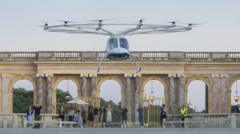After failed talks with the German government, Volocopter is reportedly in negotiations with China's Geely, which is interested in acquiring an 85% stake for $95 million, potentially relocating future manufacturing to China. Meanwhile, Lilium, another prominent EVTOL company known for its innovative aircraft design, recently entered insolvency proceedings after failing to secure a necessary €100 million loan. The company had ambitious production targets but ran out of funds after initially raising €1.5 billion, highlighting the intense financial pressures within the industry.
In the UK, Vertical Aerospace continues to push forward despite facing significant hurdles, having secured a rescue deal with its largest creditor, Mudrick Capital. The company aims to deliver 150 aircraft by 2030 but grapples with its financial viability as debt is converted into shares, significantly diluting the founder's stake. Meanwhile, Airbus’s CityAirbus NextGen project remains relatively stable, bolstered by solid financial backing and a focus on technological development.
As the market evolves, questions arise concerning the economic model for these flying taxis, specifically about operational costs and market demand. Industry insiders remain skeptical about the long-term financial success of these ventures, casting doubt on whether early investors will see returns, despite the aspirations of bringing futuristic transportation to fruition.
In parallel, successful counterparts like Joby and Archer in the US suggest that well-funded startups may still have a shot at achieving operational aircraft, albeit amid a backdrop of uncertainty and potential market pitfalls.
The progression of EVTOL technology and air taxi services remains uncertain, characterized by ambitious dreams overshadowed by financial fragility and the stark realities of bringing groundbreaking innovations to market successfully.
In the UK, Vertical Aerospace continues to push forward despite facing significant hurdles, having secured a rescue deal with its largest creditor, Mudrick Capital. The company aims to deliver 150 aircraft by 2030 but grapples with its financial viability as debt is converted into shares, significantly diluting the founder's stake. Meanwhile, Airbus’s CityAirbus NextGen project remains relatively stable, bolstered by solid financial backing and a focus on technological development.
As the market evolves, questions arise concerning the economic model for these flying taxis, specifically about operational costs and market demand. Industry insiders remain skeptical about the long-term financial success of these ventures, casting doubt on whether early investors will see returns, despite the aspirations of bringing futuristic transportation to fruition.
In parallel, successful counterparts like Joby and Archer in the US suggest that well-funded startups may still have a shot at achieving operational aircraft, albeit amid a backdrop of uncertainty and potential market pitfalls.
The progression of EVTOL technology and air taxi services remains uncertain, characterized by ambitious dreams overshadowed by financial fragility and the stark realities of bringing groundbreaking innovations to market successfully.



















